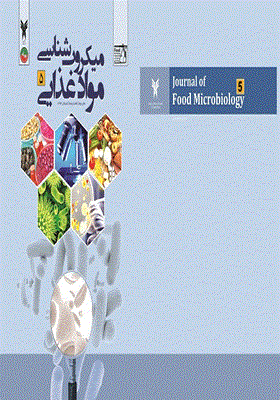Antibacterial activity of acetonic, ethanolic and methanolic olive leaf extracts of four Iranian cultivars against Escherichia coli
Subject Areas : Food Microbial ContaminationMaryam Abbasvali 1 * , Mahmoud Esmaeili Koutamehr 2 , Hamdollah Moshtaghi 3 , Mohammad Eskandari 4
1 - Department of Food Hygiene and Quality Control, Faculty of Veterinary Medicine, Shahrekord University, Shahrekord, Iran.
2 - Graduated of M.Sc of Food Science and Technology, Faculty of Veterinary Medicine, Shahrekord University, Shahrekord, Iran.
3 - Department of Food Hygiene and Quality Control, Faculty of Veterinary Medicine, Shahrekord University, Shahrekord, Iran.
4 - Department of Food Science and Technology, College of Agriculture, Shiraz University, Shiraz, Iran
Keywords: Escherichia coli, Olive leaf, Antimicrobial effect, Growth Inhibition,
Abstract :
The aim of this study was to evaluate the antibacterial activity of olive leaf extracts from four important Iranian native cultivars (Dezfol, Roghani, Zard and Shiraz) against E. coli. Acetonic, methanolic and ethanolic olive leaf extracts were prepared using a microwave. The extracts were concentrated and lyophilized. The growth inhibition effect of different concentrations of extracts was determined using the broth micro-dilution assay. The growth curves of E. coli during 24 h incubation at 37°C were drawn. The area under the bacterial growth curve and the percentage inhibition of the growth were calculated. Extracts with the concentrations of 5 and 10 mg/ml had no considerable inhibition effect on the bacterium. Acetonic extract of Dezfol and Zard cultivars with the concentration of 20 mg/ml inhibited the bacterial growth 93% and 94.9%, respectively and showed significantly stronger inhibition effect in comparison with acetonic extract of Shiraz and Roghani cultivars. Methanolic extract of Roghani cultivar with the bacterial growth inhibition of 93.4% showed significantly stronger effect in comparison with its acethonic and ethanolic extracts. Ethanolic extracts of four studied cultivars showed no antibacterial effect. Among the four important Iranian native olive leaf cultivars, Dezfol and Zard were found to possess the highest antimicrobial activity and aceton was the best solvent. On the basis of these results, it can be concluded that extracts of the Iranian native olive leaf cultivars could be used as a natural antimicrobial agent in food preservative, ointment and drugs.

